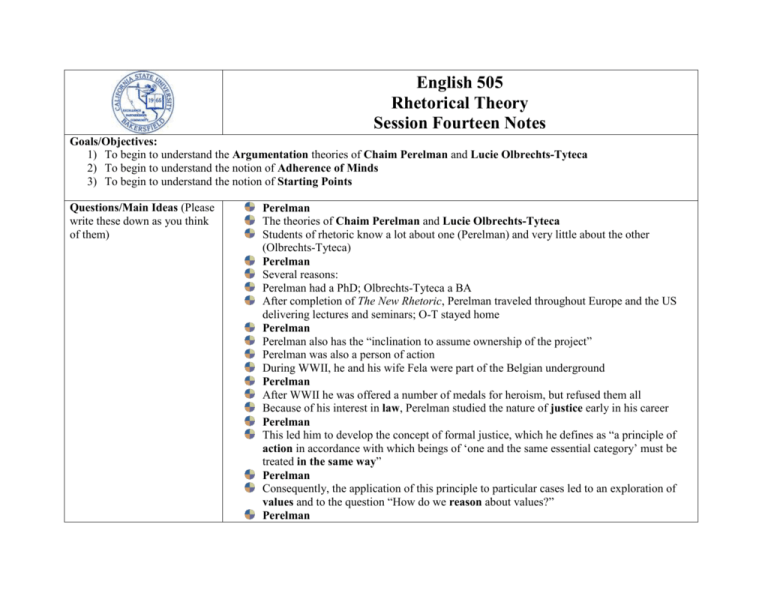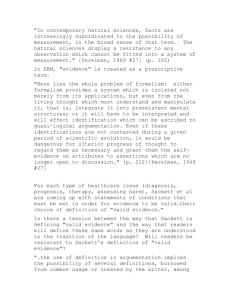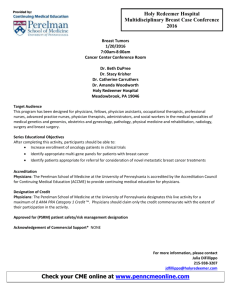English 505 Rhetorical Theory Session Fourteen Notes Goals
advertisement

English 505 Rhetorical Theory Session Fourteen Notes Goals/Objectives: 1) To begin to understand the Argumentation theories of Chaim Perelman and Lucie Olbrechts-Tyteca 2) To begin to understand the notion of Adherence of Minds 3) To begin to understand the notion of Starting Points Questions/Main Ideas (Please write these down as you think of them) Perelman The theories of Chaim Perelman and Lucie Olbrechts-Tyteca Students of rhetoric know a lot about one (Perelman) and very little about the other (Olbrechts-Tyteca) Perelman Several reasons: Perelman had a PhD; Olbrechts-Tyteca a BA After completion of The New Rhetoric, Perelman traveled throughout Europe and the US delivering lectures and seminars; O-T stayed home Perelman Perelman also has the “inclination to assume ownership of the project” Perelman was also a person of action During WWII, he and his wife Fela were part of the Belgian underground Perelman After WWII he was offered a number of medals for heroism, but refused them all Because of his interest in law, Perelman studied the nature of justice early in his career Perelman This led him to develop the concept of formal justice, which he defines as “a principle of action in accordance with which beings of ‘one and the same essential category’ must be treated in the same way” Perelman Consequently, the application of this principle to particular cases led to an exploration of values and to the question “How do we reason about values?” Perelman Perelman found the answers provided by the philosophical literature about reason and values highly unsatisfactory He could think of no way to resolve questions of value on rational grounds Perelman “Indeed, as I entirely accepted the principle that one cannot draw an ‘ought’ from an ‘is” – a judgment of value from a judgment of fact – I was led inevitably to the conclusion that if justice consists in the systematic implementation of certain value judgments, it does not rest on any rational foundation” Perelman Unable to reconcile justice with formal logic, Perelman turned to other ways in which people reason about values such as justice Perelman’s work on justice and on argumentation was motivated by: Perelman The failure of philosophy to deal with reason And by the “actual historical situation of Europe’s undergoing the physical and moralpolitical devastation of World War II Perelman Nationalist and ethnic allegiances had overwhelmed the modern political project of articulating more universal, transnational principles that might protect the rights of individuals and help mediate conflicts among groups Perelman Perelman’s work in law and in rhetoric is connected to his philosophical interests and to his work in the Belgian underground Motivated by the horrors of the Holocaust, Perelman turned away from formal logic Perelman According to Perelman: Argumentation is not the same as logic or demonstration Demonstration involves calculation made according to rules accepted by formal, deductive logic Perelman Argumentation is the study of discursive techniques allowing us to induce or increase the mind’s adherence to the theses presented for its assent Demonstration uses mathematical language, such as in a formula Perelman Argumentation uses naturally ambiguous human language Thus, demonstration allows the production of a conclusion by reasoning from premises (impersonal), while argumentation attempts to gain audience adherence to a claim (personal) Perelman Perelman suggest that a new approach to rhetoric is needed because traditional rhetoric emphasizes matters of style at the expense of matters of rationality Perelman Perelman believed that the way to more accurately discuss argumentation was to focus on its audience For Perelman, argumentation necessarily involves an audience, which makes it different from formal logic Perelman Argumentation requires a relationship between the speaker and the audience “All argumentation aims at gaining the adherence of minds, and, by this very fact, assumes the existence of an intellectual contact” Perelman The audience may not be the person or people physically present to hear the speaker And it is even more difficult to locate the exact audience for written rhetoric, since writing spreads to many audience members unknown to the writer Perelman Perelman defines the audience as “the ensemble of those whom the speaker wishes to influence by his argumentation” Perelman notes that the audience is always a “more or less systematized construction” Perelman That is, the audience is an idea the speaker considers as he or she prepares arguments and techniques of argumentation Too often, rhetoric has become an “academic exercise” in which it addressed “conventional audiences” Perelman He was concerned that rhetoric was not taught in a way to address a meaningful audience, but one that was instead invented for the rhetorical exercise at hand This limited rhetoric and made it an artificial art Perelman In argumentation, he explains, “care must be taken to form a concept of the anticipated audience as close as possible to reality. An inadequate picture of the audience, resulting either from ignorance or an unforeseen set of circumstances, can have very unfortunate results” Perelman Without a clear understanding of the audience, the speaker who thinks he or she has constructed effective arguments, may find the opposite when confronted by a real audience Perelman Accordingly, “knowledge of those one wishes to win over is a condition preliminary to all effectual argumentation” He advises, “The important thing is not knowing what the speaker regards as being true or important, but knowing the views of those he is addressing” Perelman Perelman identifies a distinction between persuading and convincing Persuasion is a form of argumentation that claims validity only for a particular audience Perelman Convincing is a type of argumentation that holds true for an audience of “every rational being” The former aims at a particular audience (those in attendance) The latter at a universal audience (all normal, adult persons) Perelman Argumentation aimed exclusively at a particular audience has the drawback that the speaker, by the very fact of adapting to the view of his listeners, might rely on arguments that are foreign or even directly opposed to what is acceptable to persons other than those present Perelman Perelman was concerned that you would use faulty arguments if you only considered the immediate audience The importance of the universal audience, on the other hand, is to provide a “norm for objective argumentation” Perelman Argumentation addressed to a universal audience must convince the reader that the reasons adduced are of a compelling character, that they are self-evident, and possess an absolute and timeless validity, independent of local or historical contingencies Perelman He felt that the strongest arguments were those that had a timeless appeal to a universal audience The concept of the universal audience implies that the quality of an argument depends on the quality of the audience that accepts the thesis of the speaker Perelman All argumentation must be planned in relation to an audience Sometimes, groups such as scientists assume that they do not address an audience and merely report the facts Perelman This rests on the illusion, widespread in certain rationalistic and scientific circles, that facts speak for themselves Perelman insists that fact do not “speak” Perelman Facts only become facts when an audience consents to view them as facts Thus, the meeting of the minds he talks about is an intellectual contact that requires people engaged in argumentation to share some frame of reference Perelman Starting Points The purpose of argumentation is to move an audience from agreement about premises to agreement about some conclusion The aim is not to prove the truth of the conclusion from premises Perelman The aim is to transfer to the conclusion the adherence accorded to the premises Although the conclusions of argumentation may be uncertain, contingent, and unacceptable to an audience, the argumentation process begins with premises the audience accepts Perelman Audience rejection of the premise of an argument is tantamount to refusing to let the argument begin Once the audience accepts the premises, the next step is to encourage the members of the audience to adhere to the conclusion Perelman Just as it adheres to the premises Premises of various kinds, then, serve as the starting points of argument Perelman distinguishes between: Perelman Starting points that deal with reality Starting points that deal with the preferable Dealing with reality Reflect the universal audience’s beliefs about things as they actually are Perelman As opposed to how they ought to be Facts These starting points are characterized by objects that are already agreed to by the universal audience Perelman A fact is a fact only by the agreement accorded to it by the universal audience Although its actual correspondence to the structures of reality is not the issue, universal agreement is achieved when persons perceive data to be rooted in those structures of reality Perelman Facts have a privileged status in argumentation because adherence to a fact requires no justification Facts can lose their privilege, however Ex: “The earth is flat!” Perelman Truths Similar to facts, truths enjoy universal agreement Perelman uses the term fact to refer to a particular datum and the term truth to refer to a broader principle that connects facts to one another Perelman Truths involve more complex systems relating to connections between facts Ex: Evolution Presumptions Are related to what is normal and likely, until there is proof to the contrary Perelman Like facts and truth, presumptions enjoy universal agreement But the audience’s adherence to presumption falls short of being maximum Audiences expect what is normal and likely Perelman Presumptions are based on these expectations Ex: good people will commit good deeds and evil people will commit evil deeds Presumptions, obviously, can be violated much more easily than facts or truths Perelman Dealing with the preferable Instead of starting with things as they are, they begin with what is preferable Values They hold only the adherence of particular audiences Perelman Some values such as honesty or beauty might seem to be general enough to secure the adherence of the universal audience Perelman claims that values are universal only to the extent that they are not made specific Perelman Once you have applied them to a particular case, the adherence of particular audiences is all that reasonably can be expected Ex: justice Perelman Differentiated between abstract values and concrete values Abstract values Are abstract when they are not attached to a particular institution or person Ex: life, liberty, and the pursuit of happiness Perelman Concrete values Are concrete when they are attached to particular persons, objects, or institutions Ex: the above then attached to Charles Manson Perelman Hierarchies Values arranged in terms of importance form hierarchies One reason for ordering values is that the simultaneous pursuit of two values can lead to incompatibilities Perelman Differentiated between Concrete hierarchies and abstract hierarchies Concrete hierarchies are related to specific objects Ex: the superiority of humans over animals Perelman Abstract hierarchies Values do not apply to specific objects Ex: the superiority of the just over the useful (such as a judicial system that values individual’s rights over society’s rights) Perelman Also differentiate between homogenous hierarchies and heterogeneous hierarchies Homogenous hierarchies One in which values differ only in degree More of a good thing or less of a bad thing is preferred Perelman Ex: mild illness preferred over a severe one Heterogeneous hierarchies Conflicting values are of a different kind They can thus come into conflict with one another and can be difficult to resolve Perelman Ex: Honesty and truth “What do you think of my new dress?” (when your friend is wearing an ugly dress) Perelman also discusses Presence Perelman Speakers/writers who engage in argumentation must choose the most promising starting points from all available To choose something and to focus on it is to give it presence Perelman Presence is “the displaying of certain elements on which the speaker wishes to center attention in order that they may occupy the foreground of the hearer’s consciousness By creating presence, the arguer creates importance Perelman Ex: Johnny Cochran and O.J.’s glove Endowed the glove with presence “If it does not fit, you must acquit” Summary/Minute Paper:









